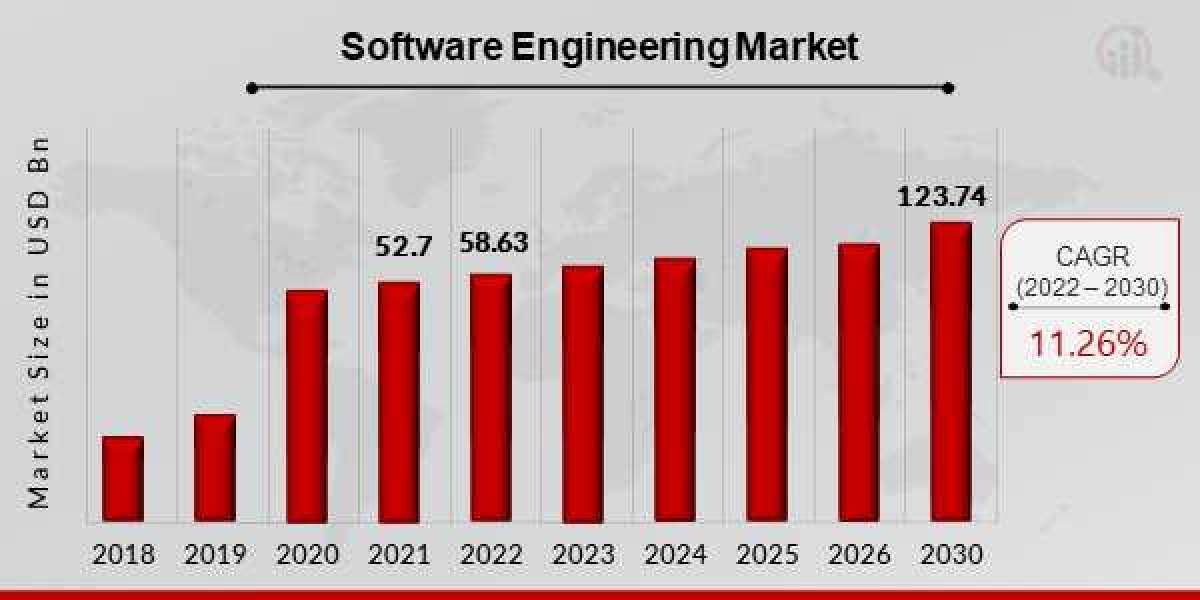Navigating the Software Engineering Market: Trends, Segments, and Leading Players
The software engineering market stands at the forefront of technological innovation, driving the digital transformation of industries worldwide. In this comprehensive article, we delve into the dynamics of the software engineering market, exploring its diverse segments, recent developments, key players, driving forces, and regional insights.
Market Overview:
The software engineering market has experienced unprecedented growth in recent years, propelled by the increasing demand for software solutions across various sectors. From mobile applications and enterprise software to cloud computing and artificial intelligence, software engineering encompasses a wide spectrum of technologies and applications. The Software Engineering Market Size was valued at USD 52.7 billion in 2021.The software engineering market industry is projected to grow from USD 58.63 Billion in 2022 to USD 123.74 billion by 2030.
Request To Free Sample of This Strategic Report - https://www.marketresearchfuture.com/sample_request/2180
Key Market Segments:
Enterprise Software Development: Enterprise software solutions cater to the needs of businesses and organizations, providing tools and platforms for tasks such as customer relationship management (CRM), enterprise resource planning (ERP), and business intelligence (BI). Custom software development, software as a service (SaaS), and platform as a service (PaaS) are key segments within enterprise software development.
Mobile App Development: With the widespread adoption of smartphones and mobile devices, mobile app development has emerged as a lucrative segment of the software engineering market. From consumer-facing apps to enterprise mobility solutions, mobile app development encompasses a diverse range of applications and platforms, including iOS, Android, and cross-platform development frameworks.
Web Development: Web development involves the creation and maintenance of websites and web applications, ranging from simple static websites to complex e-commerce platforms and content management systems (CMS). Front-end development, back-end development, and full-stack development are key areas within web development, each requiring specialized skills and expertise.
Cloud Computing: Cloud computing has revolutionized the way software is developed, deployed, and managed, offering scalable and flexible computing resources over the internet. Infrastructure as a service (IaaS), platform as a service (PaaS), and software as a service (SaaS) are major segments within cloud computing, enabling organizations to leverage cloud-based solutions for storage, computing, and software delivery.
Industry Latest News:
Rise of Low-Code and No-Code Platforms: Low-code and no-code development platforms are gaining traction in the software engineering market, allowing users to build applications with minimal coding knowledge. These platforms empower citizen developers and accelerate the development lifecycle, enabling faster time-to-market for software solutions.
Emphasis on DevOps and Agile Practices: DevOps and agile methodologies continue to shape the software engineering landscape, emphasizing collaboration, automation, and continuous integration and delivery (CI/CD). Organizations are embracing DevOps and agile practices to improve software quality, speed up development cycles, and enhance overall productivity.
Integration of AI and Machine Learning: Artificial intelligence (AI) and machine learning (ML) are increasingly being integrated into software solutions, enabling advanced capabilities such as natural language processing (NLP), predictive analytics, and autonomous decision-making. AI-driven software engineering tools and platforms are transforming the way software is developed, tested, and deployed.
Key Companies:
Microsoft Corporation: Microsoft is a global leader in the software engineering market, offering a wide range of products and services, including operating systems, productivity software, cloud computing platforms, and developer tools. With its Azure cloud platform, Visual Studio development environment, and GitHub code repository, Microsoft plays a pivotal role in the software development ecosystem.
Amazon Web Services (AWS): AWS is a dominant player in the cloud computing market, providing a comprehensive suite of cloud services for computing, storage, databases, machine learning, and more. AWS's scalable infrastructure and pay-as-you-go pricing model make it a preferred choice for businesses seeking to leverage cloud-based software solutions.
Google LLC: Google is known for its innovative software products and services, including the Android operating system, Google Cloud Platform (GCP), and a wide range of web-based applications. With its focus on AI and machine learning, Google is at the forefront of driving innovation in the software engineering market, offering advanced tools and technologies for developers and businesses alike.
Market Drivers:
Digital Transformation: The ongoing digital transformation of industries across sectors is a major driver of the software engineering market. Organizations are investing in software solutions to streamline operations, enhance customer experiences, and gain a competitive edge in the digital economy.
Demand for Customization: Businesses are increasingly seeking customized software solutions tailored to their specific needs and requirements. Custom software development services cater to this demand, offering bespoke solutions that address unique business challenges and objectives.
Emergence of New Technologies: The emergence of new technologies such as AI, IoT, blockchain, and edge computing is fueling innovation in the software engineering market. Companies are leveraging these technologies to develop next-generation software solutions with enhanced capabilities and functionalities.
Ask for Customization - https://www.marketresearchfuture.com/ask_for_customize/2180
Regional Insights:
North America: North America dominates the software engineering market, driven by the presence of leading technology companies, a strong ecosystem of startups and innovation hubs, and robust investments in research and development. The United States, in particular, is a hotbed of software engineering talent and innovation, with Silicon Valley serving as a global epicenter of technology and entrepreneurship.
Europe: Europe is a significant player in the software engineering market, with major tech hubs in cities such as London, Berlin, and Amsterdam. The region boasts a diverse ecosystem of software companies, ranging from established multinational corporations to fast-growing startups and scale-ups. European countries are also investing in initiatives to promote digital innovation and technology adoption across industries.
Asia-Pacific: The Asia-Pacific region is experiencing rapid growth in the software engineering market, fueled by increasing digitalization, rising internet penetration, and expanding tech ecosystems. Countries such as India, China, and Singapore are emerging as key hubs for software development, with a focus on outsourcing, offshoring, and digital transformation initiatives.
In conclusion, the software engineering market is poised for continued growth and innovation, driven by digital transformation, technological advancements, and evolving customer demands. As organizations across industries embrace software solutions to fuel their growth and competitiveness, the software engineering market will remain a dynamic and vibrant ecosystem, shaping the future of technology and business alike.








